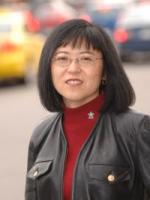This is an archive of news stories and research from the National Union of Public and General Employees. Please see our new site - https://nupge.ca - for the most current information.
Our cultural diversity is a key to reconnecting and strengthening our communities, and a much needed component for resiliency.
Commentary by:
Lorene Oikawa
Vice-President
BC Government and Service Employees' Union (BCGEU/NUPGE)
originally published in the Vancouver Sun (21 February 2009)
 Vancouver (21 February 2009) - We live in a beautiful province and it's not just because of our breathtaking scenery. Our cultural diversity is a key to reconnecting and strengthening our communities, and a much needed component for resiliency.
Vancouver (21 February 2009) - We live in a beautiful province and it's not just because of our breathtaking scenery. Our cultural diversity is a key to reconnecting and strengthening our communities, and a much needed component for resiliency.
Our communities are changing. In 2005, Statistics Canada was projecting one in five Canadians in 2017 would be non-Caucasian and non-Aboriginal. In B.C. we've already surpassed that statistic: we're at one in four British Columbians as of 2006. And BC Stats reports that British Columbians who declared themselves as having an East Asian or Southeast Asian ethnic origin was 26.1 per cent in 2006, compared with nine per cent in 1986.
Oppenheimer Park is in the heart of the Downtown Eastside of Vancouver and the usual picture is of drug users, those in poverty and those without hope. Yet there is another part of this picture: it is the historical place known as Japantown.
Many Japanese-Canadians lived and worked in the area and from 1914 the Japanese-Canadian Asahi baseball team played many of its games in the park. During the Second World War, the government forced Canadians of Japanese ancestry to relocate in prison camps away from the coast and took all their property and belongings. In 1977, the centennial year for Canada's first known Japanese immigrant, sakura (cherry blossom trees) were planted by Issei (first-generation Japanese-Canadian pioneers) as a gift to the people of Vancouver.
In 2008, the Vancouver park board's plans for redevelopment of the park included cutting down the sakura. A coalition was formed from a public meeting held in April of last year. Derek Iwanaka, chairman of the Coalition to Save the Legacy Sakura of Oppenheimer Park, noted that his grandfather, Motoi Iwanaka, was co-chair of the centennial planting ceremony.
"It [planting of the cherry trees] wasn't done on a whim," Iwanaka said. "I want to make sure the community is aware of the significance of the trees." Iwanaka was clear from the beginning that the coalition was willing to work with the park board and others to ensure that the legacy of the trees and respect for the Japanese-Canadian elders would be an integral part of the revitalization of Vancouver's Downtown Eastside.
Iwanaka cites the many meetings with supporters and community stakeholders, including Squamish Nation Coun. Deborah Baker, who spoke in support at a public forum. Japantown is on land that is the traditional territory of the Squamish, Musqueam, and Tsleil-Waututh First Nations. Support also came in the form of nearly 2,000 signatures on a petition.
The park board did cut down two trees, but is now working closely with the coalition to move one of the cherry trees in preparation for the redevelopment of the park. The park board has also struck a Japantown commemoration committee comprising community stakeholders.
Iwanaka's vision is that in 30 years, the next generation of trees will be enjoyed by residents and visitors who will also see commemorative features that explain the history and importance of the sakura. A celebratory event for the sakura will take place at the Japantown neighbourhood celebration, which will be held in March. The celebration will explore the multicultural past and present of Vancouver's Japantown, and is another example of building community connections.
Joji Kumagai works in the Japantown neighbourhood celebration and is also the executive director of Tonari Gumi, the Japanese Community Volunteers' Association. Kumagai recognizes the vibrancy and diversity of the area and acknowledges there are social issues that need to be worked on, but that he wants to "highlight the positives, the great work that is going on in the neighbourhood and a reminder of how many people make it a home."
"The Japantown neighbourhood celebration is about making connections with Japanese-Canadians, long time Aboriginal residents, Latino and Filipino communities and the labour movement."
Imagine BC has challenged us to look at possibilities for how we can create a resilient B.C.
Some of the answers have antecedents in our communities. I've described a few examples of community engagement. Imagine an exponential explosion of connections.
